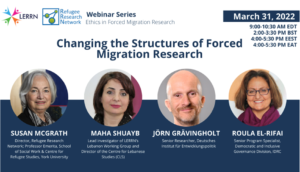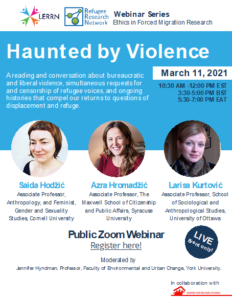The RRN Research Digest provides a synopsis of recent research on refugee and forced migration issues from entities associated with the RRN and others.
You can download the digest in PDF format here: RRN Research Digest No. 127
NEW RESEARCH AND PUBLICATIONS
Bradley, M. (2022). Colonial continuities and colonial unknowing in international migration management: the International Organization for Migration reconsidered. Journal of Ethnic and Migration Studies, 1-21. Drawing on extensive archival research, this article analyses how colonial interests and biases shaped IOM’s establishment, founding documents, and vacillating positions in decolonization movements. It examines the organization’s role in moving colonists out of newly independent states; facilitating settler colonial states’ preference for white migrants and advancing Western interests in having an international migration forum in which opposition to exclusionary policies was virtually non-existent. In particular, it questions the agency’s involvement in supporting white migration to Southern Africa in the apartheid era, and the sanitization of such work from IOM’s institutional history. Theoretically, the article analyses these dynamics through the lens of ‘colonial unknowing’, laying the foundation for deeper, historicized understandings of IOM’s continued, contested roles in migration management.
Citizenship, Refugees, and Migration in the European Union, in Giugni and Grasso, eds., Handbook of Citizenship and Migration, Edward Elgar, 2021. This chapter provides an overview of the historical development of citizenship and migration in Europe, from the early 19th century to this day. It explains how the first world war and its aftermath resulted in the transition across much of Europe from multi-ethnic and multinational communities to ethnic-national states. The chapter further looks at how those arguing for European citizenship have tried since the war to develop and enhance common European rights and free movement, nonetheless, the development of EU citizenship faces continuing challenges.
Johannesson, L. (2022). The Symbolic Life of Courts: How Judicial Language, Actions, and Objects Legitimize Credibility Assessments of Asylum Appeals. Journal of International Migration and Integration, 1-19. This article asks how the legal-administrative practice of assessing the credibility of asylum applications gains legitimacy in the eyes of the public, policymakers, and legal professionals despite resting on highly disputable assumptions. To answer this question, the author draws on interviews, observations, and written judgments from the Swedish administrative courts to explore how symbolic messages are tacitly conveyed through judicial language, activities, and objects. The analysis suggests that cohesive, albeit tacit, messages about credibility assessments being accurate (rather than arbitrary), objective (rather than subjective), professional (rather than lay), and just (rather than unjust) are produced to both near and distant audiences. The study contributes to the literature on credibility assessments by offering a theoretical perspective that can unpack the relationship between symbolic communication in courts and perceived legitimacy for disputed practices within asylum determinations and migration control.
Special Issue Introduction: Chan, Y. W., & Lan, P. C. (2022). The politics of sanitization: Pandemic crisis, migration, and development in Asia-Pacific. Asian and Pacific Migration Journal. This special issue considers the policies, including health and non-health measures, that impact migrant workers and migration. While COVID control measures are often phrased in medical language and policy discourses, they often serve multiple goals, including political and social control. The papers in this issue cover different places in Asia and the Pacific. The authors propose the “politics of sanitization” as a conceptual framework to examine the multiple dimensions of state governance and the variegated impacts upon migrants, including: (1) sanitizing space and borders, (2) stigmatization and sanitizing migrants’ bodies, (3) sanitizing ethnic borders and the national body, and (4) reorganizing the borders of sanitization and membership of the society. Read the full issue here.
Mursal, A., & Dong, W. (2022). Should Canada Pay for Refugee Healthcare? A Social Justice Analysis of the Interim Federal Health Program (IFHP). Journal of Immigrant & Refugee Studies, 1-14. This paper provides a critical review of the Interim Federal Health Program (IFHP), drawing on concepts from social justice, migration, and market-oriented theories while examining policy rhetoric, legal ramifications, and media portrayals. The recommendations in this article aim to reduce health inequities and healthcare access barriers for the refugee population in Canada. Findings suggest that Canadian federal policies have contributed to refugee health disparities.
REPORTS AND POLICY BRIEFS
The Immigration and Refugee Board of Canada (IRB) quality report – The Quality Performance in the Refugee Appeal Division 2020-21. The study reviewed 70 out of 1,282 appeals that were finalized without a hearing between October 1 and December 31, 2020 (the assessment period). The study assessed appeals and decided on their merits after a review of the information on file (documents provided by the appellant, the Minister, and the RPD record). The appeals were randomly selected in proportion to region, the language of the proceeding, ministerial intervention status, outcome, and specially selected case types. This report aims to provide a perspective to improve the Division’s performance overall.
The Immigration and Refugee Board of Canada (IRB) quality report – The Quality Performance in the Immigration Division 2020-21. The study reviewed 80 out of 915 case files finalized between January 1 and March 31, 2021 (the assessment period). This includes 40 Admissibility Hearings (AHs) and 40 Detention Reviews (DRs). The case files were randomly selected in proportion to region, decision type (oral or written), and language of the proceeding. This report aims to provide a perspective to improve the Division’s performance overall.
The “Canadian Experience” Disconnect: Immigrant Selection, Economic Settlement, and Hiring, Impact Paper – Yilmaz Ergun Dinç, The Conference Board of Canada, October 4, 2022. This impact paper explores the economic costs and benefits of the ‘Canadian experience’ and recommends ways to improve the transition from temporary to permanent residency with the goal of economic integration. The report makes recommendations for federal and provincial governments and employers.
NEWS AND BLOG POSTS
Mary Lawlor, ‘People who help refugees are not traffickers or terrorists. Stop targeting them’, Middle East Eye, 14 October. As a UN special rapporteur, Lawlor highlights her latest report to the UN General Assembly called “Refusing to Turn Away”. The report details cases from every continent of people who don’t ignore what’s happening, sometimes on their doorsteps, to migrants, asylum seekers, and refugees. But it also shows how, when people offer help, they risk being prosecuted, even jailed, for giving this help.
Amanda Coakley, ‘Winter Is Coming—for Ukrainian Refugees’, Foreign Policy, 12 October. As the cost of living has spiked across the EU in part due to rising energy prices following sanctions on Russian energy, the attitude toward Ukrainian refugees in Central and Eastern Europe is slowly beginning to turn. The shift has been fueled by relentless Russian disinformation about the economic burden of hosting refugees and populist politicians eager to seize the moment to further their agendas.
Noorulain Naseem, ‘Challenges to Pakistan’s Refugee Management’, South Asian Voices, 14 October. The situation in Afghanistan has become one of the world’s gravest humanitarian crises since U.S. troops withdrew from the country in August 2021. Meanwhile, Pakistan remains stuck between a rock and a hard place as it struggles to balance its internal security and economic priorities with its international humanitarian obligations.
Anna Mehler Paperny, Afghans in UAE facility are ‘psychologically suffering,’ Canada refugee says, Reuters, October 13. Afghans living in a makeshift refugee camp in the United Arab Emirates (UAE) staged demonstrations this week protesting the uncertainty of their status, participants told Reuters, and one refugee now in Canada said they are “psychologically suffering.”
Lloyd Axworthy And Allan Rock, The Safe Third Country Agreement is unsafe – and unconstitutional, Special To The Globe And Mail, October 11, 2022. It is said that the measure of a society is how it treats those on its margins. When vulnerable asylum seekers arrive at the Canadian border, they deserve to be treated lawfully and with dignity. We can no longer assume they will be safe if we send them back to the U.S. Indeed, the evidence establishes the contrary. The authors argue that it is time to abandon the STCA, an agreement no longer worthy of its name. Lloyd Axworthy is chair of the World Refugee and Migration Council and a former Canadian foreign minister. Allan Rock is president emeritus of the University of Ottawa, and former Canadian ambassador to the United Nations.
EVENTS, RESOURCES, DIGITAL AND SOCIAL MEDIA
www.myrefugeeclaim.ca is now live for refugee claimants. My Refugee Claim is a guide for refugee claimants in Canada. My Refugee Claim helps you:
- get informed about Canada’s refugee protection process
- stay connected to people who can help
- be prepared every step of the way.
Please share with refugee claimants if you feel the resource might be helpful to them.
New infographic: Paying National Fees While Having Precarious Status. Are you a college or university student in Ontario paying international fees when you shouldn’t? Migrant workers, convention refugees/protected persons, folks who have first-stage approval for permanent residence, and their dependents should pay national fees (also called domestic fees) in Ontario. The purpose of this infographic is to raise awareness. Please use and/or share with others who might need it.


